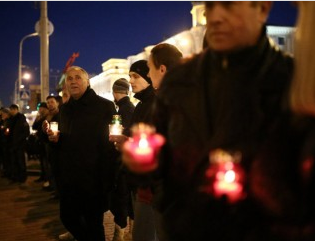About 150 people came to the KGB headquarters in Minsk to commemorate the killed

The memorial action titled "Memory Chain" took place yesterday near the KGB building in central Minsk.
People to commemorate the Belarusian intellectuals that were executed during Stalin's rule. In the night of October 30, 1937, almost 100 literary men and Belarusian culture figures were executed by shooting in the underground cells of what is now known as the KGB prison.
Ex-political prisoner Mikalai Statkevich had earlier called on people to come to the KGB buildings with candles and commemorate the victims of repressions, Euroradio informs.
Among those 150 people attending were opposition figures Mikalai Statkevich with his wife, Uladzimir Niakliaeu, Anatol Liabedzka, and Pavel Vinahradau. People lit candles and put them on the stairs of the KGB building. Some people lined up in a chain along the main avenue. Two police officers were monitoring the action but did not interfere. However, the police later noted the personal details of the organizers.
Statkevich personally thanked everyone who came to the action and asked people to leave their candles on the stairs of the KGB headquarters.
-
03.01
-
07.10
-
22.09
-
17.08
-
12.08
-
30.09



























